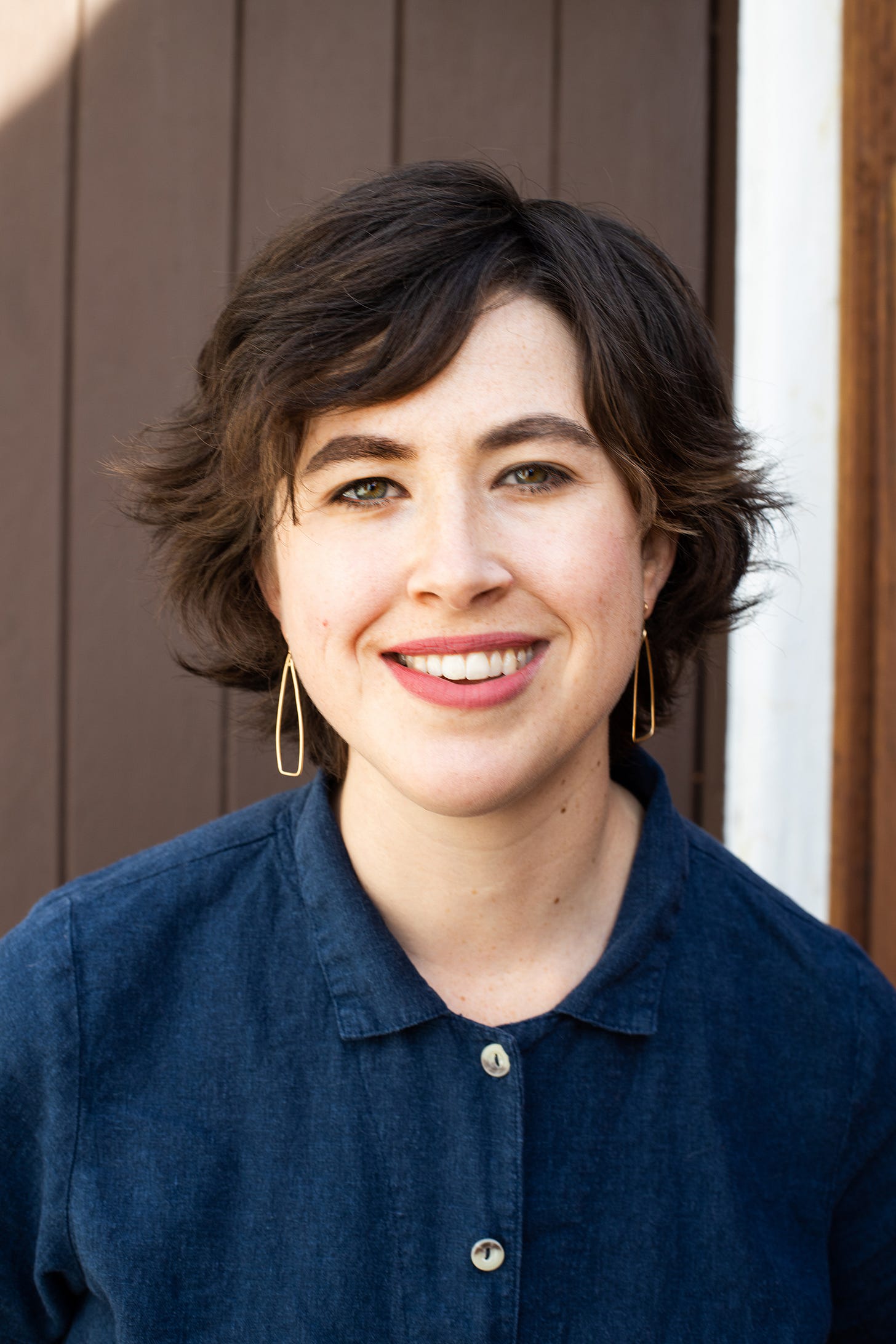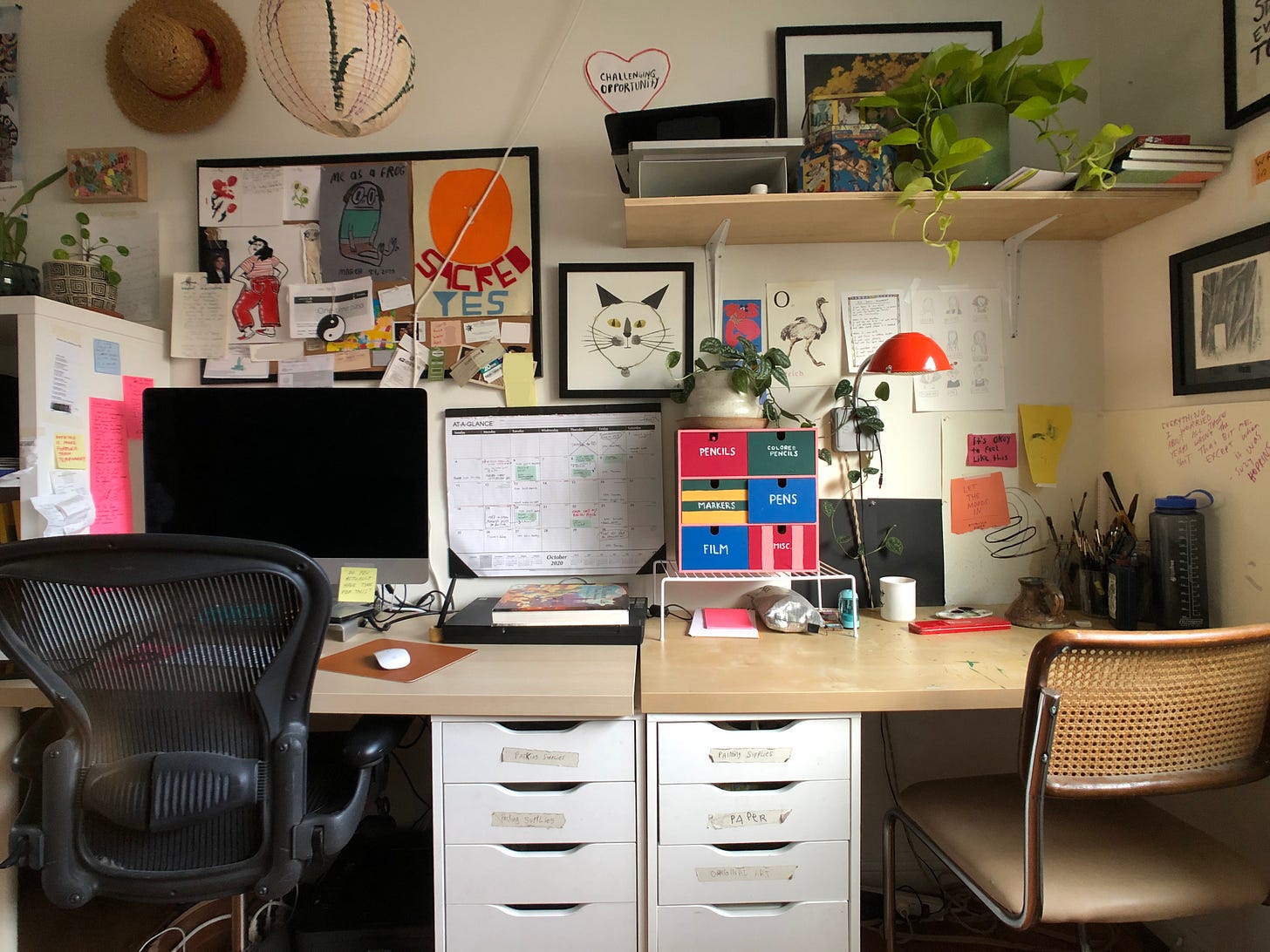Hallie Bateman's guilt-free WFH routine
“I don’t care anymore. I’m done with guilt. Life is too short.”
Welcome to the latest issue of Subtle Maneuvers. Last week: Edgar Allan Poe’s cure for procrastination. This week: a Q&A with the LA-based illustrator and writer Hallie Bateman.
Hallie Bateman
I first became aware of Bateman’s work in 2014 through her short-lived but extremely charming Pen Parade newsletter. Since then, I’ve been delighted to see her illustrations and writing in The New Yorker’s Daily Shouts section, in bookstores (her book projects include What To Do When I'm Gone and Love Voltaire Us Apart); and on Instagram, where Bateman processes the anxiety and absurdity—and joy!—of everyday life through illustrated works that are by turns sweet, zany, inspiring, and all too relatable. Last week, Bateman kindly answered some questions about her pandemic routine, and genuinely inspired me with her thoughts on seizing the power of consistency, welcoming weed into her creative process, and letting go of guilt.
Where and with whom are you riding out the pandemic?
I live in East LA with my husband Jack, who’s an illustrator and animator, and our dog Spinelli. We moved into a bigger place right before shit went down, and it’s made all the difference. We feel so lucky to each have our own office and a little backyard.
What are you working on these days?
Lots of things! I’m wrapping up work on my book Directions, based on this series, which is coming out in spring 2021. I’m illustrating my first kids’ book for Simon & Schuster, which has been SO fun to work on. And Jack and I started working together this year, writing and animating videos for a wonderful mental health nonprofit called GritX.
Also, I’m writing a movie script. I’ve been doing screenwriting on the side for a few years, and this year I’m taking it more seriously because I’m starting to actually believe in myself, which is a really good feeling.
I think so many people are wondering how others are holding it together during this stressful time. So, uh, how are you holding it together??
I definitely expected that I would have had a nervous breakdown six months into this thing, and there have definitely been low points, but overall I’ve managed to stay pretty much collected. I think key ingredients to that are therapy, weed, anxiety medication (I’m on Lexapro), friendships, and art.
My art practice has always been a safe world for me to escape into and it’s valuable to have that in 2020. I’ve always found that my art thrives with consistency—staying in one place, consistent bedtimes, drawing every night at the same time, etc. So although this pandemic has been debilitatingly sad in many ways, it has given me a more exciting and inspired art practice than I’ve had in quite a while. I feel downright powerful with a pen in my hand.
What does your typical day look like right now? Is this a big departure from your pre-COVID routine?
My work routine is directly shaped by the projects I’m working on, and varies year to year. A few years ago, when I was painting the illustrations for my book What To Do When I’m Gone, I kept very regular hours. I love that book but painting six hours a day was awful. It was very hard on my body. Now I’m pretty careful not to overload myself like that.
My days are not very consistent so I’ll just describe what I did yesterday. I woke up at 9:30, had tea and breakfast, and got to my desk around 10:30. I sent emails, made a to-do list, packed some art for shipment, and sent off some sketches for my monthly spot illustrations for Reader’s Digest.
Then I went to the store to get ingredients for dinner that night. It was so hot outside, and I was so exhausted from my small errand that when I got home, I just smoked weed and made dinner. I find cooking very relaxing. When I got my energy back, around 7pm, I worked on Directions for four hours. Then I sketched a bit in bed before falling asleep.
I’ve worked from home for eight years, so the only thing that’s different since quarantine is that I don’t travel or socialize as much as I would normally.
Do you normally have any rituals or superstitions that are part of your creative process? Have you been able to continue those—or have you had to figure out new habits with everything going on?
I’ve welcomed weed into my process in a new way. It is a creative tool that reliably transports me into a happy, productive flow state. I use it to signal to myself that it’s time to create, explore, delve in. I love weed and have been working on destigmatizing it for myself. At the same time, it is beyond fucked up that people around the country are currently serving prison sentences for it, while I’m free to smoke recreationally and talk about it on Instagram.
What have you been doing to relax and recharge?
As an artist and freelancer, there’s a lot of ways you can feel guilty on a daily basis. Guilty for not having enough free time, guilty for having too much, guilty for loving your job, guilty for not loving it. I’m trying to eliminate as much of that guilt as possible, because it’s totally useless. Since quarantine, I regularly sleep until 10. I have dessert every single day. I exercise when I feel like it. I relish my free time when I have it, relish my work when I love it. I ask for an extension if I’m just too sad to meet my deadline. I don’t care anymore. I’m done with guilt. Life is too short.
Finally, have you read, watched, or listened to anything amazing lately that you can recommend?
My husband Jack had been wanting me to watch The Adventures of Pete & Pete for years, and in quarantine we finally watched it together and it immediately became my favorite show. It’s playful and absurd and earnest and full of heart. It’s been incredibly inspiring to watch as I am learning to screenwrite myself. It’s only available on Youtube currently.
For more of Hallie Bateman’s work, check out her website, her online shop, or her most recent New Yorker piece, “Working From Home: Orientation Day.”
For more WFH Q&As, check out my previous interviews with filmmaker Erin Lee Carr and painter Susan Chen.
LOUISE GLÜCK WINS THE NOBEL PRIZE IN LITERATURE 👏👏👏
The news of the American poet’s surprise win last week unleashed much wonderful Glück content into the world, including this New York Times interview and a stream of choice quotes and trivia on Twitter (see below). But my favorite piece of Glückinalia is this excerpt from her essay “Education of the Poet,” shared on Twitter by R. A. Villanueva:
The fundamental experience of the writer is helplessness. This does not mean to distinguish writing from being alive: it means to correct the fantasy that creative work is an ongoing record of the triumph of volition, that the writer is someone who has the good luck to be able to do what he or she wishes to do: to confidently and regularly imprint his being on a sheet of paper. But writing is not decanting of personality. And most writers spend much of their time in various kinds of torment: wanting to write, being unable to write; wanting to write differently, being unable to write differently. In a whole lifetime, years are spent waiting to be claimed by an idea. The only real exercise of will is negative: we have toward what we write the power of veto.
It is a life dignified, I think, by yearning, not made serene by sensations of achievement. In the actual work, a discipline, a service. Or, to utilize the metaphor of childbirth which seems never to die: the writer is one who attends, who facilitates: the doctor, the midwife, not the mother.
I use the word “writer” deliberately. “Poet” must be used cautiously; it names an aspiration, not an occupation. In other words: not a noun for a passport.
(The complete essay appears in Glück’s 1995 collection Proofs and Theories.)
GLÜCKOMANIA


WRIGGLING THROUGH 🐛
Going forward, I’m devoting the last newsletter of each month to an advice column. Send me your creative dilemmas and I’ll do my best to provide some concrete advice based on my research into great minds’ work habits.
Thanks for reading! This newsletter is free, but if you’re feeling generous, please join me in supporting LA’s oldest independent bookstore, Chevalier’s Books, which is being forced to move locations while also suffering reduced sales due to Covid-19. Even if you’re not in LA, you can order books through Chevalier’s Bookshop.org store, or find more ways to help here.











